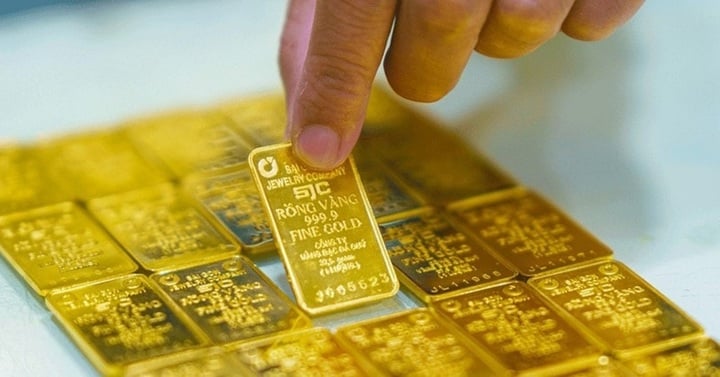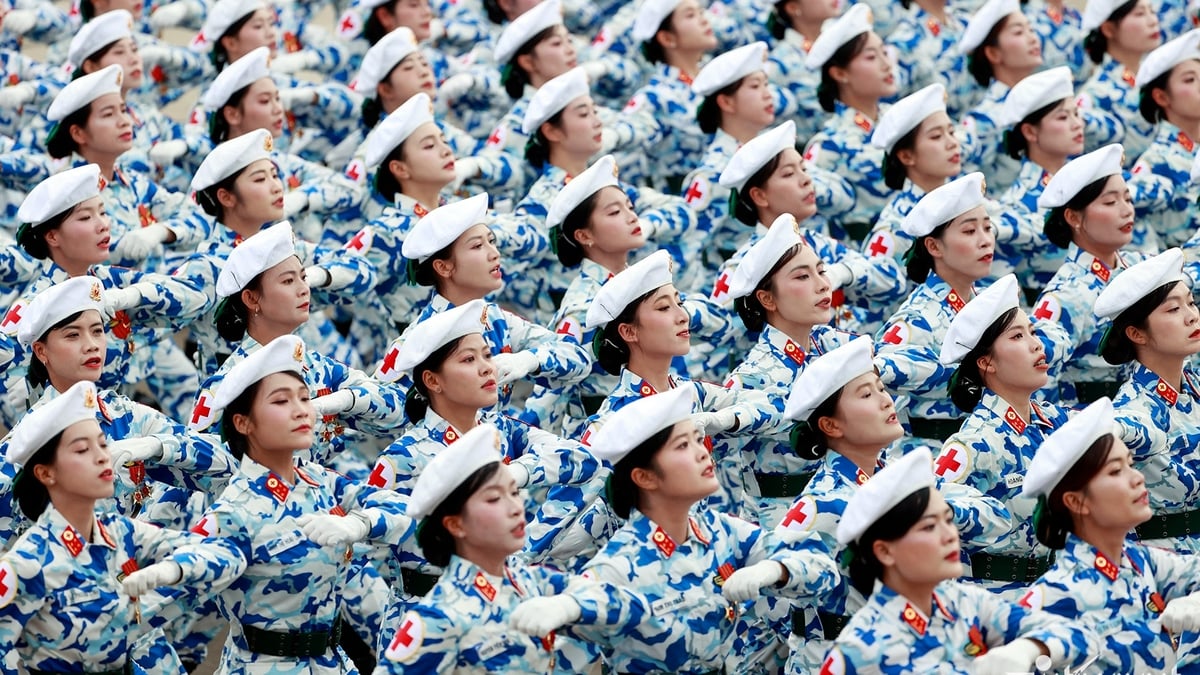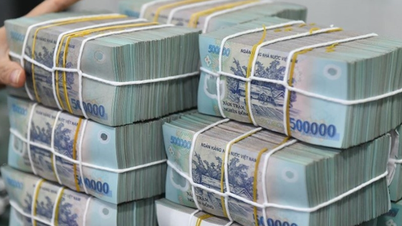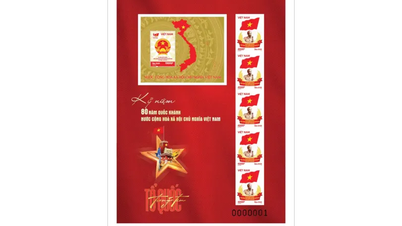According to economic expert, Dr. Nguyen Minh Phong, the Government's issuance of Decree 232/2025, amending and supplementing a number of articles of Decree 24/2012, has marked an important turning point in the process of managing gold trading activities. The key highlight is the abolition of Clause 3, Article 4 - which stipulates that the State has a monopoly on the production of gold bars, the export and import of raw gold to produce gold bars.
Instead, gold bar production is classified as a conditional business and is only allowed to be implemented when licensed by the State Bank.
“The amendment and supplementation of a number of articles of Decree 24/2012 has been proposed for a long time and the Government has also planned to amend it for a long time. Therefore, the Government's issuance of Decree 232/2025 is very good for businesses and the Vietnamese gold bar market. Because in principle, the new Decree will diversify supply sources and make the supply-demand balance better, at the same time, it will limit speculation and reduce pressure on investors and gold buyers,” said Dr. Nguyen Minh Phong.
Therefore, Mr. Phong predicts that the gold price will decrease because " Decree 232 is like a bucket of cold water poured directly onto a blazing ember furnace like the current gold price ."
“Domestic gold prices will certainly decrease after Decree 232 and the gap between domestic gold and world gold will be shortened to around 1 million VND/tael,” said Dr. Nguyen Minh Phong.
Agreeing, Mr. Dinh Nho Bang, Chairman of the Vietnam Gold Association, said that the Government's amendments and supplements to a number of articles of Decree 24/2012 will certainly have a positive impact on the gold market.
"Removing the monopoly will help the gold market compete healthily, meeting consumer demand for gold bars," said Mr. Bang.
The State officially abolished the monopoly on gold bar trading. (Illustration photo).
However, according to Mr. Bang, this will not immediately cool down the gold market because the domestic gold price, especially gold bars, will depend on import and export management.
“In addition to allowing businesses to produce gold bars, it is necessary to continue to amend the law to allow businesses to import gold to connect the domestic and international markets. Only when there is a source of raw materials can we produce gold and sell gold to the world to earn foreign currency,” said Mr. Dinh Nho Bang.
Mr. Nguyen Quang Huy - CEO of the Faculty of Finance and Banking at Nguyen Trai University emphasized that the State's abandonment of the monopoly on gold production does not mean letting it float.
This is a shift from a “single-center” mechanism to a multi-subject model but within a centralized management framework. The biggest impact is to create conditions for many capable enterprises to participate in the market, contributing to diversifying supply sources, reducing scarcity pressure, and at the same time encouraging competition in price, service and brand reputation.
The emergence of many units with capital potential and modern management systems will help the gold market become more transparent, more closely reflect international developments, thereby gradually reducing the large gap between domestic and foreign prices.
However, according to Mr. Huy, due to high licensing conditions, it is likely that only a few large enterprises will participate. The market will therefore operate according to a selective competition mechanism, different from absolute monopoly but also avoiding excessive dispersion.
“This is a balanced, open approach that still ensures stability and protects the national financial and monetary system,” said Mr. Huy.
Mr. Huy also said that gold prices are always affected by international factors such as: fluctuations in interest rates, USD prices and geopolitical tensions. Along with that are domestic factors, including the psychology of holding gold as an asset and only buying but limiting sales, and limited domestic supply.
Therefore, to "rein in" gold prices, a set of synchronous solutions is needed including:
Supply and demand regulation: The State Bank needs to proactively allocate import quotas reasonably and flexibly according to market fluctuations, in order to promptly supplement supply when the domestic and foreign price gap widens.
The second is to make transactions transparent. Accordingly, regulations on payment via banks for large value transactions will both reduce the opportunity for cash speculation and help management agencies effectively monitor the flow of gold and money.
Third is to use modern financial tools by gradually building a gold derivatives market (futures, swaps) so that businesses and investors have options to hedge risks instead of relying solely on physical gold.
Fourth is to guide expectations. Through transparent information and mainstream media, it helps stabilize psychology and reduce the phenomenon of "gold fever" caused by rumors.
“When the operating policy is transparent, the market will develop in a modern direction, more closely aligned with international practices, while still ensuring the ultimate goal of macroeconomic stability and the safety of the national financial and monetary system,” said Mr. Huy.
The Government has just issued Decree No. 232/2025/ND-CP dated August 26, 2025 amending and supplementing a number of articles of Decree No. 24/2012/ND-CP dated April 3, 2012 of the Government on management of gold trading activities.
The notable content of Decree 232/2025 is the abolition of Clause 3, Article 4 of Decree 24/2012 (The State has a monopoly on the production of gold bars, the export of raw gold and the import of raw gold to produce gold bars).
At the same time, amend and supplement regulations in the direction that gold bar production is a conditional business activity and must be licensed by the State Bank. The amendment and supplement are consistent with the goal of shifting from a monopoly mechanism for gold bar production to a mechanism for licensing gold bar production activities.
The Government stipulates that enterprises will be considered by the State Bank for granting licenses to produce gold bars when they meet four conditions.
One is to have a business license to buy and sell gold bars.
Second is to have charter capital of 1,000 billion VND or more.
Third, not being administratively sanctioned for violations of gold trading activities or being administratively sanctioned for violations of gold trading activities but having completed remedial measures according to the Decision on administrative sanctions, recommendations with implementation deadlines in the Inspection and Examination Conclusion of competent state agencies (if any).
Fourth, there are internal regulations on gold bar production including basic contents such as raw material import process; gold bar production process; production supervision process; product quality control process.
PHAM DUY
Source: https://vtcnews.vn/nha-nuoc-khong-con-doc-quyen-san-xuat-vang-mieng-gia-co-ha-tu-dinh-cao-lich-su-ar962066.html





![[Photo] First Secretary and President of Cuba begins State visit to Vietnam](https://vphoto.vietnam.vn/thumb/1200x675/vietnam/resource/IMAGE/2025/8/31/f169c1546ec74be7bf8ccf6801ee0c55)
![[Photo] Chairman of the National People's Congress of China Zhao Leji begins official visit to Vietnam](https://vphoto.vietnam.vn/thumb/1200x675/vietnam/resource/IMAGE/2025/8/31/fcfa5a4c54b245499a7992f9c6bf993a)
![[Photo] Prime Minister begins trip to attend SCO Summit 2025 in China](https://vphoto.vietnam.vn/thumb/1200x675/vietnam/resource/IMAGE/2025/8/31/054128fff4b94a42811f22b249388d4f)

![[Infographic] Traditional relations and special friendship between Vietnam and Cuba](https://vphoto.vietnam.vn/thumb/1200x675/vietnam/resource/IMAGE/2025/8/31/c4c2b14e48554227b4305c632fc740af)






















































































Comment (0)